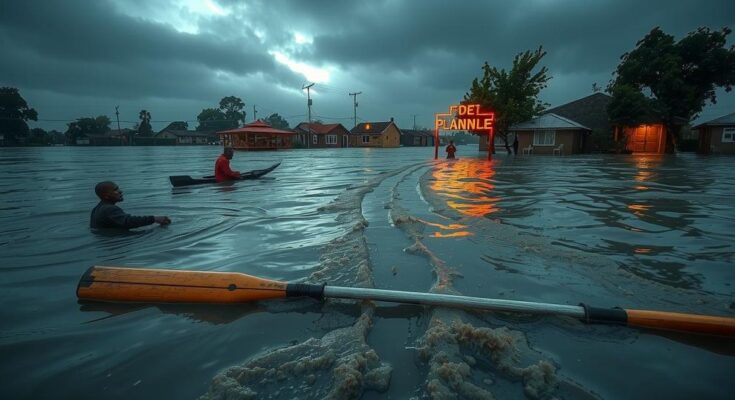A recent study reveals that climate change has intensified devastating floods in several African countries, resulting in hundreds of fatalities and the displacement of millions. The World Weather Attribution network affirms that anthropogenic warming has increased rainfall intensity significantly, especially in conflict-ridden areas like Sudan, highlighting the need for urgent actions to combat climate change and support vulnerable nations.
Recent scientific findings indicate that anthropogenic climate change has significantly exacerbated the severe flooding experienced in several African nations, including Cameroon, Chad, Niger, Nigeria, and Sudan, resulting in numerous fatalities and the displacement of millions. According to the World Weather Attribution (WWA) network’s analysis, the ongoing humanitarian crisis, largely concentrated in the Sahel region, can be attributed to intensified precipitation linked to global warming primarily driven by fossil fuel emissions. The analysis reveals that climate change has increased the intensity of rainfalls, with this year’s torrential downpours in regions around the Niger and Lake Chad basins being five to twenty percent more severe than they would have been without human-induced global temperature increases. Clair Barnes, a representative from the Centre for Environmental Policy at Imperial College London, expressed grave concerns about the persistence of these severe weather patterns, emphasizing that such extreme rainfall could occur annually if global temperatures reach a two degrees Celsius increase from pre-industrial levels. Moreover, the researchers underscored a significant correlation between elevated rainfall and the warming planet, particularly in conflict-ridden Sudan, where many displaced individuals have found themselves in vulnerable, flood-prone areas. By utilizing modeling techniques to compare current weather patterns with those of a hypothetical world devoid of human-induced warming, the researchers found that certain regions in Sudan have experienced increasingly intense and frequent precipitation. Currently, with a rise of 1.3 degrees Celsius, the occurrence of these heavy rainfall events is projected to happen once every three years and have intensified by roughly ten percent due to climate change. Issuing a noted warning, Izidine Pinto, a study co-author from the Royal Netherlands Meteorological Institute, remarked on the connection between rising temperatures and amplifying risks of extreme flooding, advocating for the upcoming UN COP29 climate summit to prioritize efforts to transition away from fossil fuels to mitigate these alarming trends. Joyce Kimutai from Imperial’s Centre for Environmental Policy reiterated the urgency of establishing a loss and damage fund to assist nations severely affected by climate change. She highlighted that Africa’s minimal contribution to global carbon emissions starkly contrasts with the disproportionate impact the continent faces from extreme weather incidents.
The increasing prevalence of severe weather events, particularly in vulnerable regions such as Africa, has become a growing concern among scientists and policymakers. The Sahel region, characterized by its proximity to the Sahara Desert, is particularly susceptible to climatic extremes due to historical socio-political disruptions and environmental challenges. This year, widespread flooding has prompted an urgent humanitarian crisis as many nations struggle to respond effectively to the harsh realities imposed by climate change. The World Weather Attribution network, which provides timely analyses of extreme weather events, focuses on understanding and quantifying the impact of climate change on these occurrences, further elucidating the complex interplay between human activities and natural disasters.
In summary, the latest research highlights that climate change, largely an outcome of human activities, has significantly increased the severity of flooding across several African nations, resulting in numerous deaths and widespread displacement. With rising temperatures contributing to more frequent and intense rainfall, experts assert that without urgent action to reduce fossil fuel dependence, these weather-related challenges are poised to worsen. The researchers advocate for urgent measures, including better infrastructure management and the establishment of financial support mechanisms, to aid the most affected regions.
Original Source: www.rfi.fr




